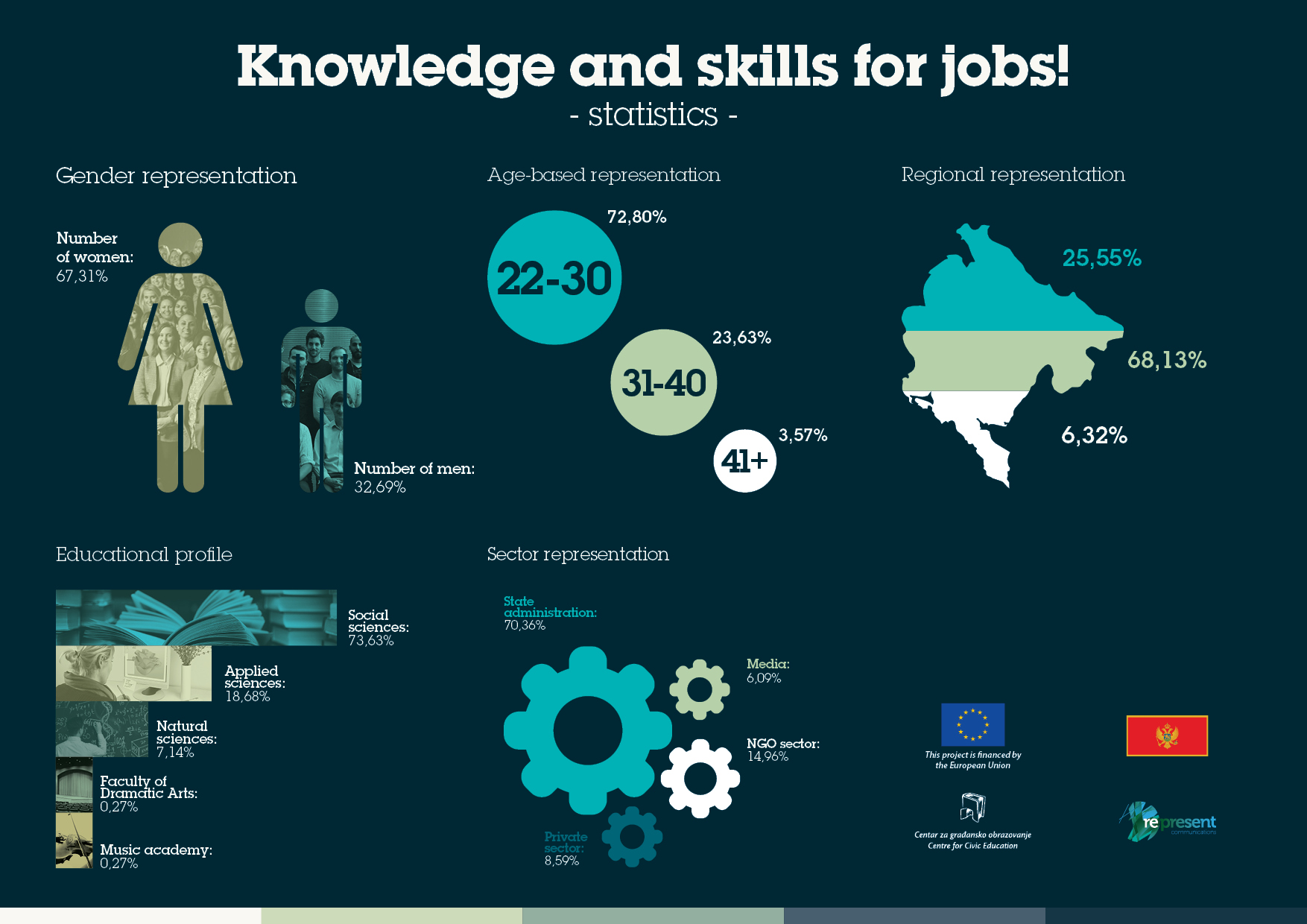Centre for Civic Education (CCE) received an outstanding number of applications from graduates who are interested to attend the programme of capacity building and working practice within the project “Knowledge and skills for jobs!”. The competition closed on 15 March 2017. Namely, after detailed technical review of documents, there were registered 364 eligible applications of university graduates.
When it comes to structure of applicants, the trend which was noted in the mid assessment of the process was continued to the great extent. In so, greatest level of interest for this form of training demonstrate young people from Central part of Montenegro – 68.13%, quarter of interested applicants was from Northern part (25.55%), while the unemployed persons from Southern part of Montenegro (6.32%) were least interested in the improvement of their competitiveness at the labour market.
“According to final data which CCE processed, young unemployed graduates still see themselves primarily in state administration – even 70.36% of total number of applicants. For NGO sector there is 14.96% of those interested applicants, for private sector 8,59%, and only 6,09% seek to build their career in media“, stated Petar Đukanović, programme coordinator at CCE, by analysing the sectoral cross-section of interests.
It was confirmed the fact that the majority of unemployed graduates has social sciences education background, as well as that they are trying proactively to solve that problem. Almost three quarters (73.63%) out of the total number of applicants is with this academic background, while the number of applications from applied sciences is several times lower (18.68%), as well as from natural sciences (7.41%). Only two persons from Montenegrin academies have applied for the participation in this project.
“Judging by final cross-section, women are still more active in the pursuit of professional training in order to facilitate their job-seeking experience, as evidenced by the 67.31% of their applications, while the percent of men who applied is 32.69%. The number of people age between 22 and 30, who are aware that they won’t find any jobs unless they position themselves on labour market, is also on the increase, hence 72.80% of applicants are young people”, emphasised Đukanović.
“We would particularly like to emphasize the importance of segment of previous training of candidates, with the aim to prepare theme for the upcoming practice. During the training, candidates will gain the knowledge and skills from three areas: communication, writing and management of projects financed through EU funds and development of public policy papers. We identified these areas as crucial for the acquisition of skills required on labour market, i.e. the so called soft skills, which can later be applied in various sector by the selected programme participants”, concluded Petar Đukanović.
Trainings will begin right after the process of selection is completed, and last through the entire month of April. Trainings will be held in Podgorica and Bijelo Polje (for the selected candidates from Northern part of Montenegro). The beginning of working practice is planned for the beginning of May 2017.
Total of 60 unemployed university graduates from Montenegro will have the opportunity to perform their practice – through the cooperation of different sectors – in state administration, NGO sector, media or in private companies, in other words, only 16.5% of applicants will have the opportunity to be a part of this competitive programme.
Project “Knowledge and skills for jobs” is implemented by CCE in cooperation with agency Represent Communications and Human Resources Management Authority, and it is financed by European Union in Montenegro, through the Directorate for the Financing and Contracting of EU Assistance Funds (CFCU) of Ministry of Finances. Project was supported within the donor programme “Young people, women and long-term unemployed in the labour market”, through broader framework of Active measure of work for employability (Operational Programme Human Resources Development 2012-2013), with Ministry of Labour and Social Welfare as its main beneficiary.
Svetlana Pešić, programme associate

